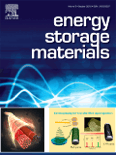
Energy Storage Materials
Scope & Guideline
Pioneering research in energy storage for a sustainable world.
Introduction
Aims and Scopes
- Energy Storage Materials and Technologies:
The journal covers a wide range of materials used in energy storage systems, including batteries, supercapacitors, and hybrid devices. It emphasizes the development of novel materials that improve energy density, efficiency, and cycling stability. - Electrochemical Mechanisms and Performance Optimization:
Research articles often explore the electrochemical processes involved in energy storage, focusing on optimizing performance through novel material designs, interfaces, and electrolyte compositions. - Sustainable and Green Energy Storage Solutions:
A significant focus is placed on environmentally friendly materials and processes, including recyclable and biodegradable materials, to support the transition to sustainable energy systems. - Advanced Characterization Techniques:
The journal encourages the use of cutting-edge characterization techniques to gain insights into the structural, electrochemical, and mechanical properties of energy storage materials, facilitating the understanding of their performance. - Interface Engineering and Stability:
Research on improving the stability of electrode/electrolyte interfaces is prevalent, addressing challenges such as dendrite formation, side reactions, and capacity fading in various battery systems.
Trending and Emerging
- Hybrid and Multifunctional Materials:
There is a growing emphasis on developing hybrid materials that combine different functionalities, such as high conductivity, mechanical flexibility, and electrochemical stability, to enhance the performance of energy storage devices. - Solid-State Battery Technologies:
Research on solid-state batteries is rapidly gaining traction, with a focus on improving ionic conductivity and interface stability to achieve high energy densities and safety. - Advanced Computational and Machine Learning Approaches:
The integration of computational methods and machine learning techniques for material design and optimization is trending, allowing for faster discovery of new materials and enhanced battery performance. - Next-Generation Battery Chemistries:
There is a notable increase in research on alternative battery chemistries, such as sodium-ion, potassium-ion, and multivalent metal batteries, which are seen as viable replacements for conventional lithium-ion systems. - Interfacial and Surface Engineering:
Research focusing on the design and engineering of interfaces and surfaces to enhance battery performance is emerging as a critical area, addressing issues such as dendrite growth and interfacial stability.
Declining or Waning
- Conventional Lithium-Ion Battery Research:
As the field evolves, there is a decreasing emphasis on traditional lithium-ion battery technologies, with researchers increasingly exploring alternatives such as sodium-ion, potassium-ion, and magnesium-ion batteries. - Basic Electrochemical Studies:
There is a waning interest in fundamental electrochemical studies that do not directly translate into practical applications. The focus is shifting towards applied research that addresses specific performance issues in energy storage systems. - Single Material Focus:
Research that concentrates solely on individual materials without considering composite systems or hybrid approaches is declining, as the development of multifunctional materials is increasingly favored. - Thermal Management Strategies:
The exploration of thermal management in energy storage systems is becoming less prominent, as advancements in materials and battery designs are addressing thermal issues inherently. - Conventional Recycling Methods:
Traditional recycling methods for energy storage materials are receiving less attention, as newer, more sustainable recycling technologies and processes are being developed.
Similar Journals

Materials Today Sustainability
Championing high-impact research for a sustainable planet.Materials Today Sustainability is a leading journal in the interdisciplinary field of sustainable materials, published by ELSEVIER. With a strong commitment to advancing knowledge in sustainability and materials science, this journal encompasses a broad range of topics, including renewable energy innovations, sustainable engineering, and eco-friendly materials development. Achieving a prestigious Q1 ranking in 2023 across Chemistry (Miscellaneous), Materials Science (Miscellaneous), and Renewable Energy, this journal plays a crucial role in disseminating high-impact research that addresses global sustainability challenges. With an impressive Scopus ranking that positions it among the top journals in Chemistry, Materials Science, and Renewable Energy, Materials Today Sustainability is an invaluable resource for researchers, professionals, and students dedicated to driving forward the agenda of sustainability and material innovation. The journal is accessible through a robust open access model, ensuring the research reaches a global audience, facilitating collaboration and innovation in this critical field.

Advanced Energy and Sustainability Research
Exploring Innovations in Energy and Environmental ScienceAdvanced Energy and Sustainability Research is a leading open-access journal published by WILEY since 2020, dedicated to advancing knowledge and understanding in the realms of energy and sustainability. With an impressive impact factor and a commitment to high-quality, peer-reviewed research, this journal serves an international audience of researchers, professionals, and students passionate about addressing critical environmental challenges. The journal encompasses a wide array of topics within environmental science and energy fields, securing notable rankings in Scopus with top percentiles across several categories, including Ecology, Energy Engineering and Power Technology, and Waste Management. Given its open-access model, Advanced Energy and Sustainability Research facilitates the dissemination of cutting-edge research, enhancing accessibility and fostering collaboration within the scientific community. This journal not only plays a pivotal role in shaping public policy and industry practices but also aims to inspire innovative solutions for sustainable development in an increasingly complex world.
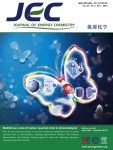
Journal of Energy Chemistry
Empowering Research in Electrochemistry and BeyondThe Journal of Energy Chemistry, published by Elsevier, is a premier international journal that has established itself at the forefront of research in the fields of electrochemistry and energy technology. With an impressive impact factor, this journal is classified in the Q1 quartile across multiple categories including Energy Engineering and Power Technology, Fuel Technology, and Electrochemistry, underscoring its significant contribution to advancing knowledge and innovation in energy systems. Based in the Netherlands, the journal offers open access to its cutting-edge research, allowing for broad dissemination and engagement among researchers, professionals, and students alike. The scope of the journal spans crucial topics from chemical energy storage to sustainable energy solutions, making it an essential resource for those looking to understand and contribute to the evolving landscape of energy chemistry.
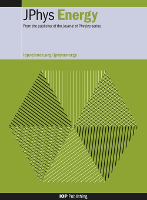
Journal of Physics-Energy
Fostering Global Collaboration in Physics and Energy InnovationsJournal of Physics-Energy, published by IOP Publishing Ltd, is a leading Open Access journal that serves as a dynamic platform for the dissemination of high-quality research within the interdisciplinary realms of energy, materials science, and materials chemistry. Since its inception in 2019, the journal has gained remarkable recognition, achieving a prestigious Q1 ranking in multiple categories in 2023, highlighting its impact within these rapidly evolving fields. With its Scopus Ranks, placing it in the top 10% of journals for General Energy and within the top 20% for Materials Science disciplines, it reflects the commitment to excellence in research and innovation. Conveniently based in the United Kingdom, the journal is designed to facilitate collaboration and knowledge exchange among researchers, professionals, and students dedicated to advancing the understanding of energy technologies and materials science. The open access model ensures that cutting-edge research is freely available, promoting global accessibility and engagement with the latest scientific advancements.

EnergyChem
Transforming Energy Chemistry for Sustainable Technologies.EnergyChem is a premier academic journal published by ELSEVIER, dedicated to advancing the field of energy chemistry and its applications in sustainable technologies. With a strong focus on biomaterials and innovative chemistry solutions, the journal has established itself as a leading platform within the research community, boasting remarkable rankings such as Q1 in Biomaterials, Chemistry (miscellaneous), and Energy (miscellaneous) for 2023. Notably, it ranks 2nd in both Materials Science and Energy categories, reflecting the high caliber of research it publishes, which is crucial for tackling pressing global energy challenges. Since its inception in 2019, EnergyChem has been committed to open and accessible research, making it an invaluable resource for researchers, professionals, and students striving for cutting-edge insights in energy conversion and storage. With its target audience in mind, the journal encourages submissions that explore innovative materials, processes, and applications that will contribute to a sustainable energy future.
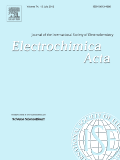
ELECTROCHIMICA ACTA
Catalyzing Knowledge in Electrochemistry Since 1959ELECTROCHIMICA ACTA is a prestigious academic journal dedicated to the field of electrochemistry and chemical engineering. Published by PERGAMON-ELSEVIER SCIENCE LTD, this journal stands out with its impressive impact factor and is categorized in the top quartile (Q1) for both Chemical Engineering and Electrochemistry in 2023, further cementing its role as a leading venue for cutting-edge research. With a publication history dating back to 1959 and converging into 2024, it has established a substantial archive of influential articles that explore various aspects of electrochemical processes, materials, and applications. Researchers and professionals in the field benefit from the journal’s high visibility, as it ranks remarkably well according to Scopus metrics, with a position in the 90th percentile for General Chemical Engineering and 84th percentile for Electrochemistry. Although ELECTROCHIMICA ACTA does not currently offer open access, it continues to serve as a vital resource for those seeking to expand their knowledge and explore innovative developments in electrochemical science.
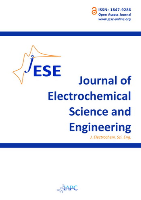
Journal of Electrochemical Science and Engineering
Fostering Breakthroughs in Materials Chemistry and Engineering.The Journal of Electrochemical Science and Engineering, published by the International Association of Physical Chemists (IAPC), serves as a vital resource for researchers and professionals in the fields of electrochemistry, materials chemistry, and chemical engineering. With an Open Access model since 2011, this journal ensures that groundbreaking research is freely accessible to a global audience, promoting collaboration and knowledge sharing. Situated in Croatia, it showcases cutting-edge developments while focusing on applied aspects related to electrochemical technologies. Notably, the journal holds a commendable Scopus ranking, placing it within the Q3 quartile for multiple categories, including Chemical Engineering (miscellaneous) and Electrochemistry. By fostering innovative research and comprehensive reviews, the Journal of Electrochemical Science and Engineering plays a crucial role in advancing the understanding and application of electrochemical processes, making it an indispensable platform for academics and practitioners alike.
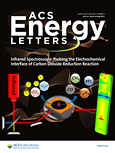
ACS Energy Letters
Leading the Charge in Energy Research and SustainabilityACS Energy Letters, published by the American Chemical Society, is a prestigious peer-reviewed journal designed to disseminate innovative and impactful research in the multifaceted field of energy science. Since its inception in 2016, the journal has quickly ascended to a remarkable status, achieving Q1 rankings in critical categories including Chemistry (miscellaneous), Energy Engineering and Power Technology, Fuel Technology, Materials Chemistry, and Renewable Energy, Sustainability and the Environment as of 2023. With an emphasis on rigorous research methodologies and interdisciplinary collaboration, ACS Energy Letters serves as a vital platform for scholars, professionals, and students to explore cutting-edge research that addresses contemporary energy challenges. While maintaining a commitment to advancing knowledge without open access, it offers profound insights into sustainable practices and innovative solutions that are crucial for the future of energy systems globally. The journal's esteemed standing in the chemical and energy sectors underscores its significance, making it an essential resource for anyone invested in the advancement of energy technologies and sustainable practices.
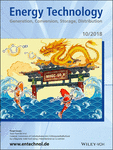
Energy Technology
Advancing the Future of Energy InnovationEnergy Technology, published by Wiley-VCH Verlag GmbH, is a prominent peer-reviewed journal dedicated to advancing the field of energy research and technology. With an ISSN of 2194-4288 and an E-ISSN of 2194-4296, this journal has made a significant impact in the energy sector, holding a Q2 category ranking in the Energy (miscellaneous) category for 2023, and proudly positioned in the 77th percentile within the Scopus ranking for General Energy. Since its inception in 2013, Energy Technology has consistently published cutting-edge research, innovations, and reviews that cater to a wide array of topics including renewable energy, sustainable technologies, and energy efficiency. The journal does not offer open access, yet it remains a key resource for researchers, professionals, and students who are committed to exploring the dynamic field of energy. The journal's efforts to disseminate rigorous scholarship make it an invaluable asset for anyone looking to contribute to or understand the future of energy-related technologies until 2024.
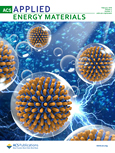
ACS Applied Energy Materials
Exploring Cutting-edge Advances in Energy SystemsACS Applied Energy Materials, published by the American Chemical Society, is a premier journal dedicated to the cutting-edge fields of energy materials, chemical engineering, and electrochemistry. With an impressive impact factor and consistently ranked in the Q1 category across multiple disciplines—including Chemical Engineering, Electrical and Electronic Engineering, and Materials Chemistry—this journal serves as a pivotal platform for researchers and professionals focused on innovative solutions for energy systems and materials science. Since its inception in 2018, ACS Applied Energy Materials has been committed to disseminating high-quality research that addresses pressing energy challenges, promoting sustainability and efficiency in various applications. Its competitive Scopus rankings reflect the journal's influence and relevance within the academic community, making it an essential resource for anyone looking to stay at the forefront of energy materials research.